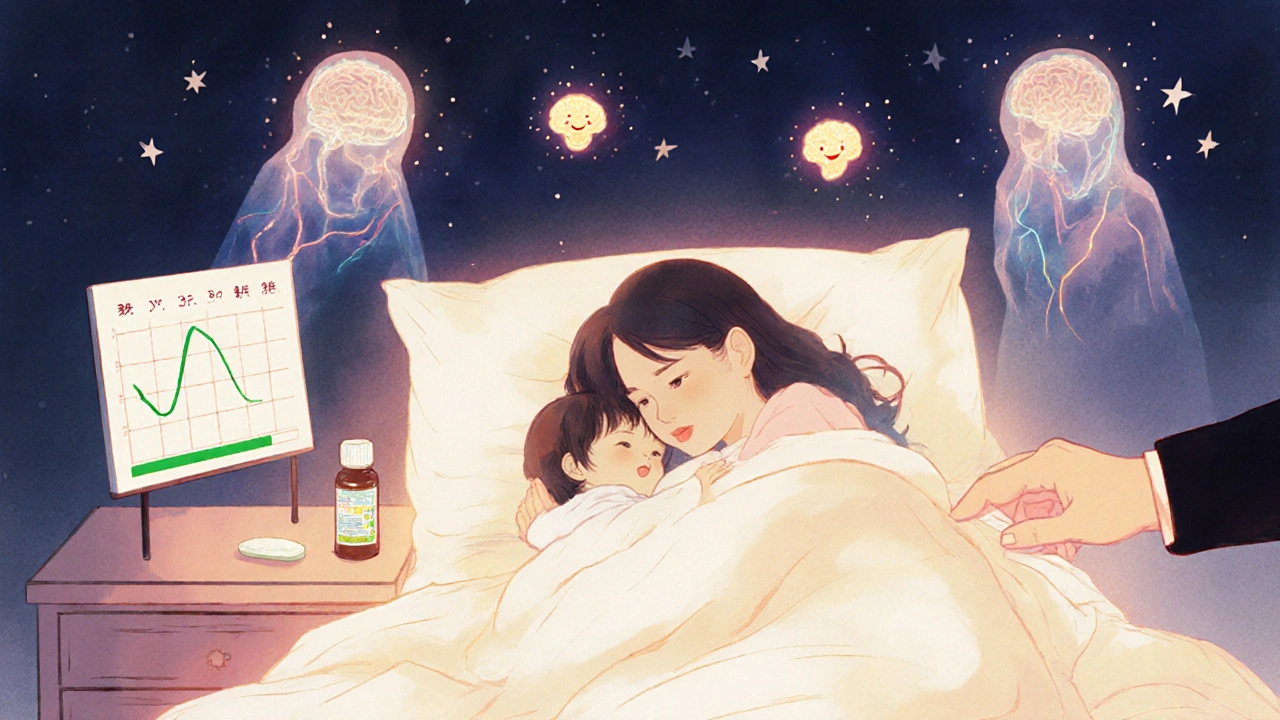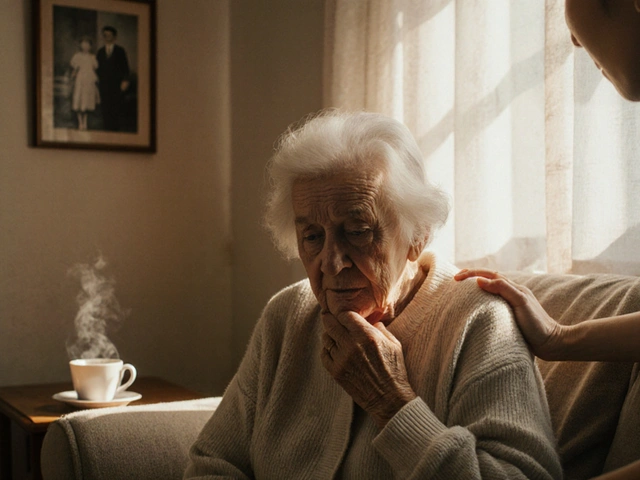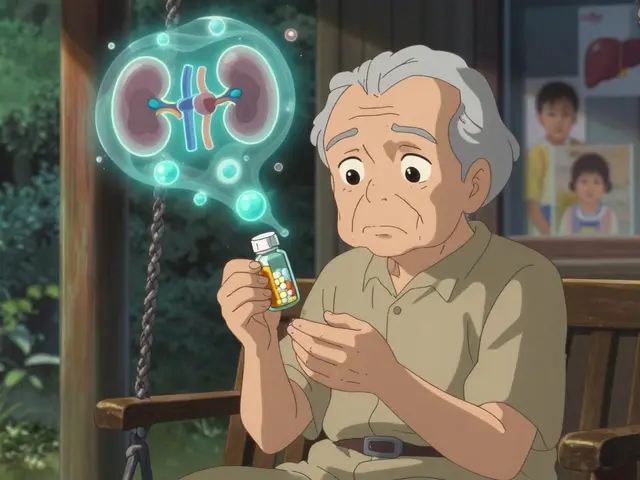When you're pregnant and struggling with depression or anxiety, the question isn't just whether to take an SSRI-it's whether not taking one could be more dangerous. Around 1 in 7 pregnant women experience significant depression or anxiety. For many, the weight of untreated illness is heavier than the fear of medication. The truth? The risks of staying off SSRIs often outweigh the risks of staying on them.
What Are SSRIs, and Why Are They Used in Pregnancy?
SSRIs-Selective Serotonin Reuptake Inhibitors-are a class of antidepressants that help balance brain chemicals linked to mood. Common ones include sertraline (Zoloft), citalopram (Celexa), escitalopram (Lexapro), and fluoxetine (Prozac). These aren’t new drugs; fluoxetine was approved in 1987, and since then, millions of pregnant women have taken them. They’re not magic bullets, but for many, they’re the difference between surviving pregnancy and being consumed by it.Depression during pregnancy doesn’t just mean feeling sad. It can mean losing interest in everything, not being able to sleep, feeling worthless, or having thoughts of harming yourself. In the U.S., suicide is the leading cause of pregnancy-related death, accounting for 20% of all maternal deaths. That’s not a small number. It’s not a rare outcome. It’s a real, documented risk-and it’s far more common in women with untreated depression.
The Real Risks: What Science Actually Shows
Let’s cut through the noise. You’ve probably heard scary headlines: “SSRIs cause birth defects.” “Antidepressants lead to autism.” But the data tells a different story when you look closely.First, major birth defects. Large studies tracking over 1.8 million births found no meaningful increase in serious congenital malformations with SSRI use. The baseline risk of a major birth defect is about 2.5%. With SSRIs, it’s 2.8%. That’s a 0.3% increase. For context, smoking during pregnancy increases the risk of birth defects by 15-20%. Alcohol? Even higher. SSRIs don’t rank among the top environmental risks.
One exception: paroxetine (Paxil). It’s linked to a slightly higher risk of heart defects in the first trimester-rising from 0.5% to about 0.7-1.0%. That’s why doctors avoid it in early pregnancy. Sertraline, on the other hand, has the cleanest safety profile. It’s the go-to first-line choice for pregnant women because it crosses the placenta less than others and has the lowest association with complications.
Then there’s PPHN-Persistent Pulmonary Hypertension of the Newborn. It’s rare. In the general population, it affects 1-2 out of every 1,000 babies. With SSRI use in the third trimester, that number goes up to 3-6 per 1,000. That sounds alarming, but here’s the key: even with SSRI use, 99.4% of babies do not develop PPHN. And when you control for how severe the mother’s depression was, the link weakens even more. Severe depression itself raises the risk of PPHN. So is it the drug-or the illness?
Preterm birth and low birth weight are also concerns. Studies show SSRI-exposed babies are slightly more likely to be born early or underweight. But again, when researchers compare women with depression who took SSRIs to women with depression who didn’t, the difference shrinks. In fact, the biggest risk factor for preterm birth isn’t the medication-it’s the untreated depression. Women with unmanaged depression are over twice as likely to deliver early.
The Bigger Risk: What Happens When You Stop
This is the part no one talks about enough. If you stop your SSRI cold turkey during pregnancy, your chance of a depressive relapse jumps to 92%. That’s not a typo. That’s from a 2022 randomized trial. For women who stay on their meds? Only 21% relapse.Relapse doesn’t just mean crying more. It means skipping prenatal visits. Not eating well. Using alcohol or drugs to cope. Not bonding with your baby. In fact, women with untreated depression are three times more likely to develop postpartum depression-and that condition can last for years. The American College of Obstetricians and Gynecologists (ACOG) says untreated depression leads to 30% lower maternal bonding scores. That’s not just emotional-it’s biological. Babies of depressed mothers show higher stress hormones, delayed language development, and altered brain activity.
And then there’s suicide. The risk of suicide during pregnancy is real. A woman who stops her antidepressant and relapses is at higher risk than one who stays on treatment. That’s not speculation. That’s CDC data.

Which SSRIs Are Safest?
Not all SSRIs are created equal. Here’s what the experts recommend:- Sertraline (Zoloft): First choice. Lowest risk of birth defects, lowest PPHN risk, least placental transfer. Starting dose: 25-50mg, can go up to 150-200mg if needed.
- Escitalopram (Lexapro) and Citalopram (Celexa): Also considered safe. Good for anxiety-predominant cases.
- Fluoxetine (Prozac): Second-line. Longer half-life, so it stays in the system longer. May be better for anergic depression (low energy, no motivation).
- Paroxetine (Paxil): Avoid in first trimester. Higher risk of heart defects.
Switching medications during pregnancy is risky. If you were doing well on an SSRI before you got pregnant, staying on it is usually safer than switching. Your body knows how to handle it. Your brain is stable. That stability matters more than a theoretical risk.
What About Breastfeeding?
Good news: most SSRIs are safe during breastfeeding. Sertraline is the gold standard here too. It transfers in very low amounts into breast milk-often lower than what the baby would get from a daily infant dose of the drug. Fluoxetine? It builds up in milk over time, so it’s less ideal if you’re nursing. Citalopram and escitalopram are also low-risk.Studies tracking babies exposed to SSRIs through breast milk show no significant differences in growth, development, or behavior compared to unexposed babies. The American Academy of Pediatrics considers sertraline compatible with breastfeeding.
What If You Want to Stop?
If you’re thinking about quitting, don’t stop suddenly. Abruptly stopping SSRIs can cause withdrawal symptoms: dizziness (42% of women), nausea (38%), brain zaps (29%), insomnia, and intense mood swings. In one study, 73% of women who quit cold turkey had withdrawal symptoms.Instead, work with your doctor to taper slowly-over 4 to 6 weeks. Monitor your mood with weekly PHQ-9 screenings. If your score climbs above 10, you may need to slow the taper or restart. Don’t assume you’ll be fine just because you “feel better.” Depression can sneak back in quietly.

Long-Term Effects on Kids
You’ve probably heard about autism or ADHD risks. Here’s the real picture:A 2022 JAMA Pediatrics study found a small increase in autism risk with SSRI exposure. But a 2021 Lancet study-this one adjusting for family history, genetics, and maternal mental health-found no link at all. Why the difference? The earlier study didn’t account for the fact that depression runs in families. And depression itself is linked to neurodevelopmental differences in children. So is the SSRI causing autism-or is it the underlying condition?
Columbia University researchers found that children exposed to SSRIs in utero had higher rates of depression by age 15. But here’s the catch: those same children had mothers with more severe depression. When researchers compared them to children of mothers with similar depression levels who didn’t take SSRIs, the difference vanished. That’s called “confounding by indication.” It’s the biggest flaw in many alarmist studies.
The NIH’s 2023 review says it plainly: “The risks of SSRIs in pregnancy are justified when juxtaposed next to the risks of more severe untreated mental illness.”
What Should You Do?
There’s no one-size-fits-all answer. But here’s what the guidelines say:- If you have mild depression and are doing well with therapy, you might try non-medication approaches first.
- If you have moderate to severe depression-or you’ve had relapses before-staying on an SSRI is strongly recommended.
- Sertraline is the safest starting point.
- Don’t switch meds unless you have to.
- Don’t stop cold turkey.
- Keep screening your mood during and after pregnancy.
And remember: your mental health is part of your physical health. Treating depression isn’t about being “on drugs.” It’s about being able to eat, sleep, bond, and survive pregnancy. It’s about being the mother your child needs.
What’s Next?
New research is coming. In 2025, the NIH launched a $15 million study tracking 10,000 mother-child pairs to see how SSRIs affect long-term brain development. Results won’t be ready until 2030. But for now, the evidence we have is clear: the risks of untreated depression are far greater than the risks of carefully managed SSRI use.Work with your OB-GYN and your psychiatrist. Ask questions. Demand data-not fear. You’re not being selfish for wanting to feel better. You’re being responsible.
Are SSRIs safe during pregnancy?
Yes, for most women. Large studies of over 1.8 million births show no significant increase in major birth defects with SSRIs like sertraline, citalopram, or escitalopram. Paroxetine is avoided in the first trimester due to a small increased risk of heart defects. The benefits of treating depression often outweigh the small, measurable risks of medication.
Which SSRI is safest in pregnancy?
Sertraline (Zoloft) is the most recommended first-line SSRI during pregnancy. It has the lowest placental transfer, the lowest risk of birth defects, and the lowest association with PPHN. It’s also considered safe during breastfeeding. Citalopram and escitalopram are also good options. Fluoxetine is used but has a longer half-life. Paroxetine should be avoided in early pregnancy.
Can SSRIs cause autism in babies?
Current evidence does not support a clear link. One study suggested a small increase, but when researchers adjusted for family history and severity of maternal depression, the risk disappeared. Autism is strongly influenced by genetics and environmental factors unrelated to medication. The consensus among major medical groups is that SSRIs do not cause autism.
What happens if I stop my SSRI during pregnancy?
Stopping abruptly increases your risk of depressive relapse to 92%. That means higher chances of preterm birth, low birth weight, postpartum depression, substance use, and even suicide. Withdrawal symptoms like dizziness, nausea, and brain zaps affect 73% of women who quit cold turkey. Always taper slowly under medical supervision.
Are SSRIs safe while breastfeeding?
Yes. Sertraline passes into breast milk in very low amounts and is considered safe for nursing infants. Citalopram and escitalopram are also low-risk. Fluoxetine builds up over time and is less ideal. The American Academy of Pediatrics lists sertraline as compatible with breastfeeding. Babies exposed through milk show no developmental differences compared to unexposed infants.






